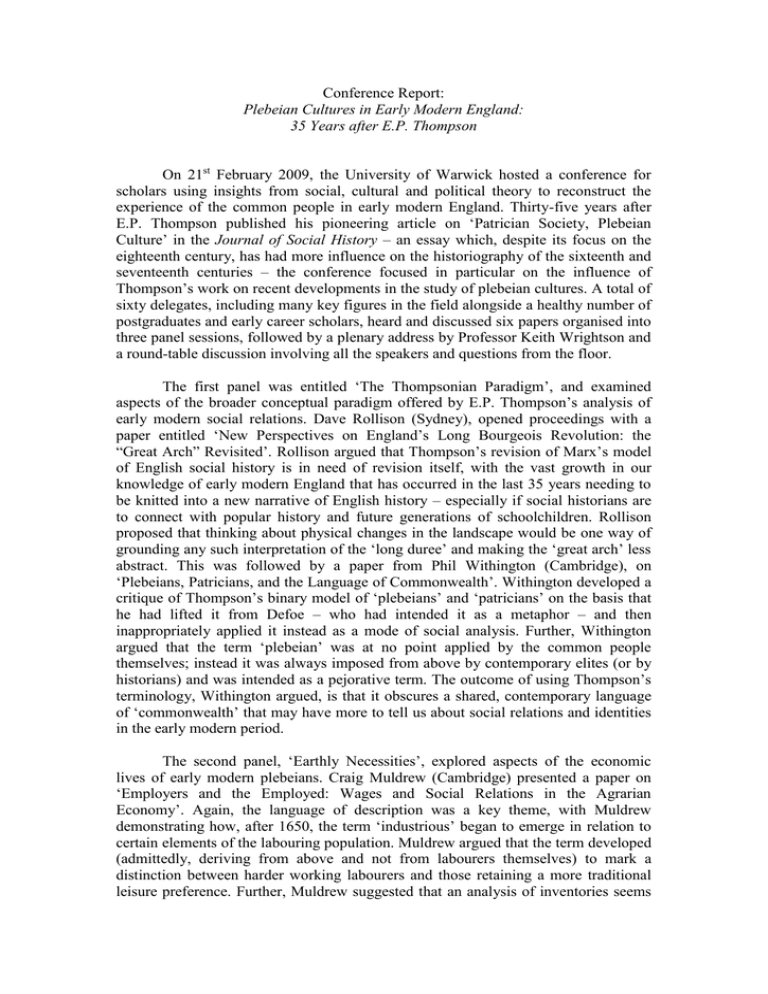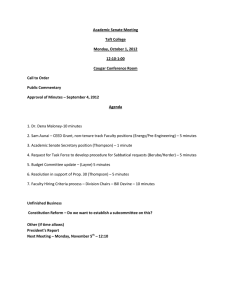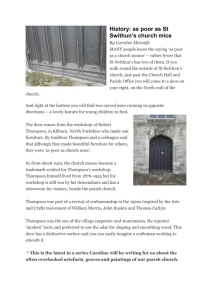Conference Report: On 21
advertisement

Conference Report: Plebeian Cultures in Early Modern England: 35 Years after E.P. Thompson On 21st February 2009, the University of Warwick hosted a conference for scholars using insights from social, cultural and political theory to reconstruct the experience of the common people in early modern England. Thirty-five years after E.P. Thompson published his pioneering article on ‘Patrician Society, Plebeian Culture’ in the Journal of Social History – an essay which, despite its focus on the eighteenth century, has had more influence on the historiography of the sixteenth and seventeenth centuries – the conference focused in particular on the influence of Thompson’s work on recent developments in the study of plebeian cultures. A total of sixty delegates, including many key figures in the field alongside a healthy number of postgraduates and early career scholars, heard and discussed six papers organised into three panel sessions, followed by a plenary address by Professor Keith Wrightson and a round-table discussion involving all the speakers and questions from the floor. The first panel was entitled ‘The Thompsonian Paradigm’, and examined aspects of the broader conceptual paradigm offered by E.P. Thompson’s analysis of early modern social relations. Dave Rollison (Sydney), opened proceedings with a paper entitled ‘New Perspectives on England’s Long Bourgeois Revolution: the “Great Arch” Revisited’. Rollison argued that Thompson’s revision of Marx’s model of English social history is in need of revision itself, with the vast growth in our knowledge of early modern England that has occurred in the last 35 years needing to be knitted into a new narrative of English history – especially if social historians are to connect with popular history and future generations of schoolchildren. Rollison proposed that thinking about physical changes in the landscape would be one way of grounding any such interpretation of the ‘long duree’ and making the ‘great arch’ less abstract. This was followed by a paper from Phil Withington (Cambridge), on ‘Plebeians, Patricians, and the Language of Commonwealth’. Withington developed a critique of Thompson’s binary model of ‘plebeians’ and ‘patricians’ on the basis that he had lifted it from Defoe – who had intended it as a metaphor – and then inappropriately applied it instead as a mode of social analysis. Further, Withington argued that the term ‘plebeian’ was at no point applied by the common people themselves; instead it was always imposed from above by contemporary elites (or by historians) and was intended as a pejorative term. The outcome of using Thompson’s terminology, Withington argued, is that it obscures a shared, contemporary language of ‘commonwealth’ that may have more to tell us about social relations and identities in the early modern period. The second panel, ‘Earthly Necessities’, explored aspects of the economic lives of early modern plebeians. Craig Muldrew (Cambridge) presented a paper on ‘Employers and the Employed: Wages and Social Relations in the Agrarian Economy’. Again, the language of description was a key theme, with Muldrew demonstrating how, after 1650, the term ‘industrious’ began to emerge in relation to certain elements of the labouring population. Muldrew argued that the term developed (admittedly, deriving from above and not from labourers themselves) to mark a distinction between harder working labourers and those retaining a more traditional leisure preference. Further, Muldrew suggested that an analysis of inventories seems to confirm that this hierarchy between labourers was emerging on the ground as well as in public discourse: a finding that problematises a homogeneous category of ‘plebeians’. This was followed by a paper by Andy Wood (East Anglia), entitled ‘'Place, Custom and Memory: Thinking about Fuel Rights in Early Modern England'. Wood argued that customs relating to fuel rights have the potential to tell us about much more than the economic lives of the common people: they had a psychological relevance to plebeians as they were tied to notions of memory, place and identity. Wood also mounted a defence of Thompson’s binary view of social relations as a conflict between ‘plebeians’ and ‘patricians’, demonstrating that conflicts over fuel rights were often articulated and understood by participants as ‘us’ and ‘them’ clashes between rich and poor or gentry and commoners. This was not always the case however, and Wood also provided examples of how conflict over customary rights could be a means of marginalising certain elements of the poor, and might also reflect on the politics of gender. Wood concluded that conflict between ‘plebeians’ and ‘patricians’ was one, but not the only, aspect of social relations revealed by a focus on fuel rights. The third panel, headed ‘Weapons of the Weak’, investigated plebeian responses to power and authority in the period, and the appropriateness of using Thompson’s conclusions on popular protest to describe them. First, Bernard Capp delivered a paper on ‘Deference, Defiance and Tobacco’ in which he suggested that a major downside of Thompson’s legacy (though one he never intended) was to focus the historiography of riot almost exclusively onto food, enclosure and antiimprovement rioting. Capp provided an account of riots in Gloucestershire in the 1650s that were pro-improvement: they were in favour of growing tobacco in the area. Further, contrary to Thompson’s hypothesis that plebeians rarely show open defiance to authorities out of fear or the internalisation of deference, these tobacco riots, like many other riots in the period, were in fact characterised by acts of open defiance. Capp suggested that an analysis of different forms of popular protest to those focused on by Thompson might also provide a rather different picture of plebeian cultures. John Walter then spoke on ‘E.P. Thompson and the Politics of Early Modern Protest’. Walter offered a survey of work on popular political forms in which he was keen to stress that, despite limitations in his work, this should not overshadow the paramount importance of Thompson in establishing the legitimacy of the subject. Walter demonstrated the ambiguous legacy and value of Thompson’s ideas by discussing an example of an anonymous libel which was full of the language of class oppression and an ‘us’ and ‘them’ perception of social relations, whilst at the same time being littered with classical references that complicate any conclusions that this libel was a product of a discreet plebeian culture. Walter also questioned Thompson’s characterisation of seventeenth-century protest as more open and religious than that of the eighteenth century – finding little evidence of this – and suggested that future work might usefully pay more attention than Thompson to how popular political was related to high political culture (something he suggested Mike Braddick was beginning to do). Then Keith Wrightson, who had travelled over from Yale especially for the occasion, delivered a plenary lecture in which he reflected on the broad development of the field of English social history in the past three or four decades. On the influence of Thompson’s ideas he suggested that the term ‘plebeian’ had serious limitations, as Thompson preferred to employ the term in the undiscriminating sense that the early modern gentry had – an application that overlooked important distinctions between the ‘plebs’, especially a growing ‘social polarisation’ between the poor and the ‘middling sort’ that has become a central part of our understanding of social relations in the period. Wrightson also argued that Thompson had similarly neglected to pick apart the category of ‘patrician’, seeing the ruling class as static and thus overlooking the ways in which its formation and reformation might help us understand similar processes at work amongst other classes. Wrightson suggested that these limitations were a product of Thompson’s laudable focus on the struggle between classes, rather than their internal dynamics and features, but further argued that – whilst struggle matters – class, agency and identity are not only about struggle and the study of plebeian cultures would benefit from keeping this is mind. Wrightson then proceeded to offer some suggestions as to how the study of plebeian cultures might move forward. First, he called for a ‘return to counting’; urging that detailed economic history can help us establish the structures that informed important contemporary distinctions between social groups. Secondly, he stressed the importance of trying to uncover how earlier modern plebeians self identified, to rectify a continuing overreliance on elite perceptions. In particular, he suggested that the most fruitful avenue for pursuing this aim might be to focus on the ways in which common people selfidentified in their connections with each other, rather than how they presented themselves to elites, and that the institutions and associational forms which facilitated such ‘nexuses of connection’ should be studied. In part, Wrightson’s call for a focus on connections between the common people was a call to redress the balance of much recent work – influenced by Wrightson himself – that has emphasised the polarisation of early modern society. Professor Wrightson’s stimulating plenary drew together many of the key themes of the day, and struck an ideal balance between critical reflection and looking to the future – which set the tone for a concluding round-table discussion. Key issues that arose centred on the importance of the language of description; the place of religion in Thompson’s work; the potential of studying associational forms; the issue of gender (though more the lack of a female speaker at the conference than its place in Thompson’s work); and Thompson’s greater impact on sixteenth-and-seventeenthcentury historiography than on that of the eighteenth century. Perhaps the most provocative question came from Adam Fox. Fox asked whether, in light of the many criticisms and limitations that historians had begun to identify in Thompson’s thinking, his legacy had been to lead us up the wrong path rather than to blaze a trail in the study of plebeian culture. It was a question that struck at the heart of the two main questions of the day: how should we judge Thompson’s legacy, and, subsequently, how should we proceed with research into plebeian cultures? Needless to say, both issues continued to be debated for many hours after this successful and stimulating conference had officially drawn to a close with thanks offered to all the participants and organisers.


